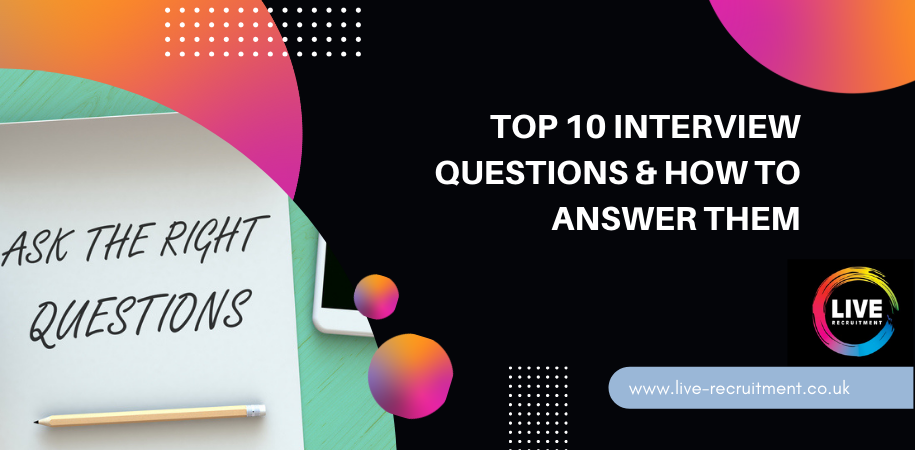Many people find interviews daunting because of the fear of the unknown. But when you pick an interview apart, it’s actually a lot more predictable than you think. The questions that you will be asked are often similar across interviews. So while the exact phrasing might be different, the answer they are looking for is often the same.
When you break down interviews in this way, it becomes a lot easier to spot patterns in the questions that will help you to answer them more confidently. If you have to memorise a speech, you’ll be a lot more confident in your delivery the tenth time you say it, rather than the first time. Answering interview questions is the same; the more you practice, the more confident and convincing you will become.
But how do you go about guessing what will come up in an interview? There is no way to know for sure, but you can be pretty confident that the following 10 questions will appear in some format throughout the interview. If you know how to confidently answer these questions, you’ll be well on your way to interview success.
“Tell me about yourself”
This question often trips people up in its simplicity. Candidates get immediately flustered and ask, “well, what do you want to know?”. Instead of immediately turning the question around, you need to determine what is your “elevator pitch”. This is the short, two-minute-or-less introduction that lets an interviewer know the highlight reel that brought you to this point. You might quickly summarise your degree, your career path and where your ambition lies.
This is often the first question you will be asked, and it sets the tone for the whole interview. Remember to refer back to your CV, but don’t just list your work history; tell them a story. By the end of your short introduction, they should be able to join the dots between your work history and get a good idea of your personality. If there are personal details like hobbies that are relevant to your work, don’t be afraid to mention these, too.
“What attracted you to this role?”
This question will help to dig down into what motivates you. From everything in the job description, what part stood out to you the most. Some people will be attracted to a new role because it is a stepping stone in the right direction that will help them to gain more experience in a specific field. Others will be attracted to a role because it offers more of the work they love and less of the work they would rather avoid. Be prepared to get specific about what parts of the job description stood out to you.

“Why do you want to work for this company?”
This is not the same as the question above. This is a test of your research skills to find out what you’ve learned about the company. Do you know they treat their employees really well? Have you spoken to other employees and learned about their training programme? Do you know that they have an impressive roster of clients? This is your opportunity to show off your research and demonstrate that you understand the company culture and what they have to offer.
“Why are you leaving your current role?”
This might sound like an opportunity to trash your previous employer but don’t. This question is an opportunity to demonstrate your professionalism. So, even if you walked out of your previous role in a rage, look for the positives and try to remain neutral about your previous employer. If all you can do is trash talk your previous employer, this might leave the interviewer wondering if you’ll be doing the same to them in six months.
If you’d rather not talk about the specifics about why you left, shift the focus to yourself. You can talk about the opportunities you would like to seek elsewhere and what was missing in your role that you are hoping to explore in your next role. And if you haven’t left your previous role yet, then you can simply talk about what made you think about looking for a new position.
What is your greatest strength?
This job interview question is your opportunity to tell the employer anything that you really want them to know, so don’t waste it. Be cautious how you answer this question so that you don’t appear overly confident or like you are bragging. Instead, highlight the professional qualities that make you an excellent employee. Some examples could include your passion for helping others, your communication skills or even leadership. Think about the job description and what specific skills they are looking for. And always make sure you can back it up with an example.

What is your greatest weakness?
Perhaps the hardest question to answer with confidence, this one forces you to look at your shortcomings. No one will believe that you don’t have any flaws. And no one will want to hear about a flaw that will make you unsuitable for the role. Instead, think about the minor flaws that you are aware of and actively working to improve.
For example, if you say that your greatest weakness is that you can be quite introverted, you can turn this on its head by showing what you are doing to overcome this. You can also demonstrate how something that might be perceived as a weakness can actually be a strength in some situations. For example, you could point out that being an introvert makes you an excellent listener, which is essential for leading a team.
What are your long-term goals?
This question could be asked in many different ways. For example, they might ask, “where do you see yourself in five years?”. This question is an opportunity to talk about where you would like your career to take you. You don’t have to be specific about where you’ll be working; they’re not looking for blind loyalty. Instead, they want to know what interests you about your job and how you would like to shape your career.
For example, you might say that you’re interested in taking on a leadership role, or you might say that you would like to focus on a specific niche. Don’t be afraid to dream big and share your ultimate aspirations. Just don’t say that you’d like to be running the company, as this rarely goes down well.
Can you tell me about a situation where…
This is an incredibly common interview question that crops up time and time again. Situational interview questions can be daunting because it feels like you have to squeeze a lot of information into your answer without losing interest. This is where the STAR method comes in handy. This is a useful mnemonic device to help you remember how to answer this type of question.
When you have an interview question that demands a situational answer, you should be wary about rambling. Using this method will help to keep your answer focused. Describe the situation, the task, the action and then the result. This answer method will keep you on track and stop your audience from getting bored. It’s also a simple way to structure your answers so that you don’t leave out any important information.
What did you dislike about your previous role?
This question tests your ability to be constructively critical of your previous employer. Can you identify the weak points in the company and in your job description without being petty? It’s another test of professionalism, but when handled correctly, it’s just another way to share what you are looking for in your next role.
Some suitable criticisms could include the scope of the work, the size of the team, the level of responsibility or the resources available to you. By focusing on these things, you can easily turn criticism of your old employer into a positive comment on your own performance. For example, if you say that you didn’t feel you have the autonomy in your role to have a real impact, this will show the interviewer that you care about making a difference with your work.
What motivates you?
Employers want to know what gets you out of bed in the morning because this helps them to create a work environment where you can thrive. Some people are motivated by money and the opportunity to earn bonuses. Others are motivated by prestige and the chance to work with well-known clients. And others are motivated by working with other people because they thrive on interactions.
The only wrong answer to this question would be to say that you don’t know what motivates you because this could signal a lack of direction or a lack of ambition. Rather than say you don’t know, you could say that you are still in the early stages of your career, so learning and development are important sources of motivation. See some further info about this question in a previous post.


